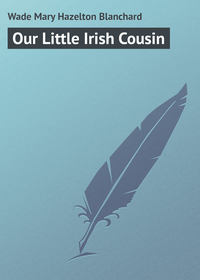 полная версия
полная версияOur Little Swiss Cousin
Fritz led the way to a place where the chasm was narrow enough for him to spring across with the aid of his mountain staff. Carl followed, while Fritz reached over from the other side and seized the boy as he landed. Carl laughed. He wasn't the least bit frightened.
"I think you did that because of what mother said, Uncle Fritz. You act as though I were a child, but I am very sure-footed and have been in slippery places before."
"No doubt of that, Carl. You are a brave boy, too. But it is very easy to make a misstep in such a place. I shouldn't like it very much if you were down at the bottom of that chasm at this moment. It wouldn't be easy getting you up again, even though it is not deep."
Here and there the two travellers met little streams of water flowing along over the surface. The day had been quite warm for this time of the year, the ice had melted a little, and the water was running off in these streams.
"O, uncle, look!" cried Carl, as they came near another chasm in the glacier. "Here is another bridge of ice over which we can cross. How clear it is; it looks like glass."
By this time the moon was shining in all her glory. "It is like fairy-land," said Carl to himself as he looked back at the glacier which they were just leaving, and then onward to the mountain-tops in the distance, lighted up by the soft yellow light.
"The mountains are God's true temples, aren't they?" said Fritz, after a few moments. "But come, my dear, it is getting late. We must move quickly now, even though we are tired. The lights in the village above us are calling, 'Hurry, hurry, good people, before we sleep for the night!'"
It had been a long, hard day, but Carl had enjoyed every moment. That night as he lay in the warm bed prepared for him, he thought it all over before he slept.
How kind these new friends were, too. Although he and his uncle had reached the village so late, a warm supper was made ready for them at once and everything done for their comfort. Why, the good woman of the house had even taken a hot stone from the hearth and put it into Carl's bed.
"I want you to sleep warm, my boy," she said, as she kissed him good night, "and it must be colder up here than in your own home in the valley."
The next day Carl had a chance to look around the little village. You would hardly call it a village, either. There were only six or eight houses. Their roofs were weighted down with rocks, like the cottage where Carl had stayed through the summer. It was the only way to be sure of safety, for the winter winds blew fiercely here; Carl knew that. There were long months when the cows must stay in their stable, week after week.
"But how neat the barn is!" exclaimed the boy. "It is almost like a sitting-room. Your father has a table and chairs here, as though he stayed here a good deal of the time."
"Yes, father likes his cattle so much, he wishes to be with them all he can," answered Marie, who was the only child in the house where Carl and his uncle were staying.
"Don't you think our cows are lovely, and did you notice the big black one in the first stall? She is the queen of the herd. Father let me name her, and so I called her 'Marie,' after myself."
"O, yes, I noticed her first of all," answered Carl. "I should think you would like it here better in summer than in winter. Aren't you ever afraid of avalanches, Marie?"
"Yes, indeed, Carl. Sometimes I lie awake and tremble all night. I can't help it. That is when the wind blows very hard and the house rocks to and fro. Then I think of the great drifts of snow above us on the mountain. What if they should start down and come in this direction! There would be an end of us; the whole village would be buried.
"Once last winter, I was wakened by a terrible noise. I knew what it was at once. It was an avalanche. It was coming this way with a sound like thunder. I ran into mother's room; she and father were on their knees, praying. The danger lasted only a few minutes and then all was still. But, do you know, Carl, in the morning we had sad news.
"The house of a neighbour had been carried away. His cattle were buried somewhere in the great snowslide and were never heard of again. But he and his family were safe because they happened to be spending the night with another neighbour."
"Was it a strong wind that caused the avalanche that night?" asked Carl.
"No, father said that could not have been the reason. But you know that sometimes even the cracking of a whip is enough to start the dry snow in the winter-time. Then, as it sweeps downward like a waterfall, more and more is added to it and in a short time it becomes a snowy torrent. O, it is fearful then!" and Marie pressed her hands together in fright at the very thought.
"You poor little girl. Don't talk about it any more. I'm so sorry I said a word about avalanches," said Carl. His voice was very gentle, because he felt so sorry for Marie. "Perhaps there won't be any more coming down this side of the mountain," he added. "Then you will be just as safe as I am in my home in the valley."
"Carl, Carl! where are you?" The words came from the direction of the house. It was Carl's uncle, who had wondered what had become of the boy. The children came hurrying out of the barn.
"It is growing dark, my dear, and I was afraid you had wandered off somewhere," said Fritz. "I promised your mother to look out for you, Carl, so you see I am doing my duty. Come into the house now. We will have a pleasant evening with our good friends. Then, with morning light, we must start on our homeward way."
That night many stories were told of the fairies and the gnomes. It is no wonder that when Carl went to sleep he dreamed he was living in a cave with the fairies, and that the gnomes brought him a pile of gold heavy enough to make him rich all the rest of his life.
CHAPTER VIII
SANTA CLAUS NIGHT
It was two weeks before Christmas. Carl had been back from his visit to the mountain village for more than a month. No harm had come to him on his way home, although heavy snow had fallen, which made hard walking. It was worst of all in crossing the glacier, but the boy's uncle took great care, and no accident came to either of them.
And now the joyful day had come which Carl liked best of all the year. He had saved up money for months beforehand to buy presents for his parents and his friend Franz.
What would he receive, himself? He thought sometimes, "I wonder if father will buy me a rifle. He thinks I can shoot pretty well now, I know that. But a rifle of my own! That would be too good to be true."
It was the custom of Carl's village to have the Christmas tree on Saint Claus's Day, two weeks before the real Christmas Day. They did not wait for the time at which we give the presents. Christmas was a holiday, of course, but it was somewhat like Sunday; everybody went to church. There was a sermon, and a great deal of music.
Saint Claus's Day was the time for fun and frolic. Good children looked forward to that day with gladness; but the bad children! dear me! they trembled for fear they would be carried off to some dreadful place by Saint Claus's servant.
All the day before Carl was greatly excited. He could hardly wait for night to come, but it did come at last. The supper-table was scarcely cleared before a loud knocking and stamping of feet could be heard outside.
Rudolf hurried to open the door, while Carl clapped his hands. Who should enter but a jolly-looking old fellow with rosy cheeks and twinkling eyes. He was dressed from head to foot in furs. Surely this was Santa Claus himself. There was a great pack of goodies on his back. Carl could see the red apples and bags of candy sticking out.
But who was the creature that followed Santa Claus? His face was black, his clothes were black, everything about him was black as soot. He carried a broom over his shoulder.
"This is my servant," said Santa in a big, strong voice. "I hope the child in this house has been good. I just called at a place where there was a boy who had not minded his mother. I was going to let my servant carry him off, but he promised to be good, so I forgave him this time." Santa Claus tried to scowl fiercely while he said these words.
"Have you been a good boy?" he cried, suddenly turning toward Carl.
"O, yes, sir, I have tried hard," answered the boy, who was half afraid, although, somehow, this same Santa Claus spoke very much like a friend of the family who lived near by.
"Very well, then." With this, Santa covered the floor with nuts and fruit which he shook out of his pack. A party of men who had followed him and his servant into the house, and were dressed up in all sorts of funny ways, laughed and joked with Carl's father and mother.
After a few moments of fun, Santa Claus went away, first wishing the boy and his parents good night and a merry day on the morrow. They had many more calls to make before their work would be done, and they must hurry on their way, they said.
When the door was closed, Carl said, "Father, I don't believe that is the real Santa Claus; it is neighbour Hans, who has dressed up like him. I knew his voice, too."
Carl danced around the room laughing, while his father and mother laughed, too.
"When I was a little tot," Carl went on, "I used to be scared, I tell you. I was afraid of doing naughty things all the year for fear mother would tell Santa Claus, and his servant would then sweep me away with his broom. Oh, I know better now." And Carl ran first to his father, and then to his mother, and gave each of them a hearty kiss.
The next morning, when he came downstairs, there was the dearest little fir-tree in the corner of the room, and under it lay some mittens and stockings, besides the rifle for which Carl had hoped and longed.
"Santa Claus helped me get them," said Rudolf, and they all sat down to breakfast laughing at the merry joke.
CHAPTER IX
THE WONDERFUL ABBEY
It was the beautiful spring-time, and the country had begun to look green and fresh again after the long months of snow and frost.
"Carl, my dear, how would you like to go on a pilgrimage to the Blessed Abbey?" asked his father one night as they finished milking the cows. "Easter Sunday is almost here, and the people of the village are talking of going to Einsiedeln together."
"O, father, that would make me happier than anything else in the world. What a fine time we can have! And only to think that I can see the place with my own eyes. Do you really mean it?"
"Yes, my boy, but do you think you can walk so far without getting tired out?"
Carl laughed. "Look at me, father; see how I have grown since last summer," and the boy stretched to make himself seem as tall as possible.
"Very well, then. Your mother knows about it, and is getting things ready for the journey now."
The next three days Carl could think of nothing else. He was full of excitement. The night before they were to start, he said to his father:
"Please tell me the story of the Wonderful Abbey again. I wish to have the picture still brighter in my mind as we journey along our way to-morrow."
Rudolf leaned back in his chair. His face was lighted by a happy smile as he said:
"Carl, my dear child, I love to think of the good souls who have made this world so beautiful by living in it. Yes, they have made it more beautiful than the grandest mountains or the loveliest lakes can make it.
"One of those good men was the holy Meinrad, who lived over a thousand years ago. He came from Germany to teach the priests at a small convent on the Lake of Zurich. After a while he said, 'I will live the life of a hermit in a little cell in the forest. I can best worship God if I live alone.'
"So he went up on the mountainside and made a hut, where he prayed and fasted day after day. It is said that the wild beasts felt his goodness, and would do him no harm. Whenever there was need, he went out to do good deeds among men. People heard of him through all the country round. They came to ask his advice when they were in trouble, or to seek help in other ways.
"But one day two robbers came to Meinrad's cell. They came with a bad purpose; they thought he must have a store of gold hidden away, and they wished to get it. The holy man gave them food and drink, but what do you think these wicked men did in return for such kindness? They cruelly murdered him! Then, finding no money, they hurried away.
"Meinrad had two birds who kept him company in the lonely forest. They were ravens, and had grown very tame, loving their master dearly.
"When the murderers fled, these birds followed them down the mountainside, across the lake, and into the town. The men stopped at an inn for food and rest. The birds flapped their wings against the windows, and kept up shrill cries. Every one in the inn wondered what it could mean. When this had kept up for several hours, the men thought, 'This is a warning to us from Heaven. We will confess what we have done.'
"They told the fearful story, and were put to death by the angry people who heard it. Ever since that time the place has been called the Ravens' Inn, and two ravens were carved out of stone and placed upon the wall. When we go to Zurich, Carl, you shall see those stone ravens, for they are still there."
"Now, please tell me about the holy abbey, father," said Carl, "and how it was blessed by the angels."
"After a while," his father went on, "the priests, who had heard the story of Meinrad's death, decided to build a grand church. It was to be on the very spot where Meinrad's cell had stood and he had been murdered. It was a beautiful building. When it was entirely finished, bishops and knights came to consecrate it to the Lord. People gathered from far and near to listen to the service.
"Now, it was the custom of the good Bishop Conrad to pray at midnight. On the night before the great day of consecration, he arose for his usual prayer, and, as he did so, was surprised to hear beautiful music in the air around him. He listened closely. Behold! it was the chorus of angels; they were consecrating the chapel. He bowed his head in wonder and awe.
"The next morning, when the people had come together for the sacred service, the bishop waited in silence till nearly noon, and then he told the crowd of listeners what had happened during the night. There was nothing for him to do now; the angels had already made this a holy place.
"But the people would not, could not, believe it. They still pressed the bishop to go on with the service. At last, he felt that he could not satisfy them in any other way, so had already begun, when a clear voice was heard to say, 'Brother, do not go on; for see, it is already consecrated.'
"Then the people were able to understand that the bishop had spoken truly, and the place was indeed a holy one now. Ever since that time good Catholics of France and Germany, as well as from our own country, make pilgrimages to the abbey of Einsiedeln. It is now a very grand building. Thousands and thousands of dollars have been spent to make it beautiful.
"And Carl, dear, you shall see there the very image of Jesus and Mary which the good priest Meinrad brought to the place when he first sought his home there. Better still, my boy, you shall drink from the fountain from which Jesus himself once drank, as I have been told."
Carl listened closely to his father's words. Others might tell him afterward that this was only a legend, but he was an earnest little Catholic, and believed that every word of it was true.
The moment of starting came at last. Rudolf, with his wife and Carl, was joined by several others of the village people. Franz was among them, together with his parents. There were many, many miles to walk, and several days must be spent upon the way. The nights were passed at taverns along the roadside. As our friends journeyed onward, they were joined by other parties, all going in the same direction, – to the abbey blessed by the angels.
In one party there was a blind man, who hoped to see again after he had drunk from the wonderful fountain. In another, there was a person who was lame, and who moved painfully along on crutches. He believed he would be able to leave these crutches behind him if he could once reach the abbey.
As Carl drew nearer and nearer, he could see that thousands and thousands of people were all going the same way. And now as they began to climb the mountainside, there were crosses at every turn in the road. He never passed them by without stopping to kneel and pray.
He was a stout little fellow, as we know, but he was growing very tired now. His feet were quite sore, and there were deep cuts in the soles. This showed that he had walked very many miles over the hard roads. But there were many others like him who had never travelled so far from home before; and some of them were old and feeble, too. He would not let his mother think he was tired. Oh, no, not for the world.
Ah! the spires were at last in sight, and every one hurried forward.
It was very, very beautiful, Carl thought, when he had passed through the great doorway, and looked upon the wonderful sight within. He had never before seen anything half so grand. The walls and ceilings were richly gilded, and there were many statues in the nooks and corners.
But best of all was the precious image of the Divine Child and His mother. It was only a clumsy-looking little wooden figure, and was black with age, but it was adorned with precious stones that sparkled brilliantly.
Before Carl entered the sacred building, he first stopped at the fountain, and drank from each one of the fourteen spouts. This alone would make his life better, he thought. But after he had received a blessing from the priest within the church, and had touched the marble on which the image of Jesus rested, he could go away perfectly happy.
There were many small inns in the village, and you may be sure that they were well filled at this time. Carl's family were together with their friends at one of them, and they had a merry time. When they were well rested, however, Carl's father said to the boy:
"We will take a trip to Zurich before going home. It is only a few miles away, and I promised to show you the stone ravens, you know. An old friend of mine lives right on the shore of the lake, and he will be glad to have us lodge with him."
What a lively place Zurich seemed to the little country boy. Every one was so busy, and there was so much going on all the time.
"Why is it such a busy place, father?" asked Carl.
"It is largely because of the business in silk, Carl. We do not raise silk in Switzerland; it is too cold. But the cocoons are brought here from Italy, and thousands of people are kept busy in spinning, weaving and dyeing the precious stuff.
"The wife of my good friend is at her loom every moment she can spare from the work of her house. But she tells me the pay is very poor, yet the rich man who gives her the work sells the silk for great prices. Ah! it is hard to be poor."
Yes, it was true. Nearly every little home around the lake had its loom, and one could hear the whirr and the click in the houses as he passed along.
Carl took trips on the pretty steamboats on the lake. They had been built in the city and Rudolf took the boy to the shipyard where others were being made.
"All the iron steamers of Switzerland are built here," he said, "besides others which are sent to Italy and Austria. Yes, it is a great and busy place."
"Our schoolmaster told us once that people call these lakes of ours 'the eyes of the earth.' Don't you think that is a pretty idea, father? They are very bright and clear, as they lie walled in between the mountains.
"And, father, he says that there were people living on these lakes ages and ages ago. It was before any history was written, even."
"Then how do they know that such people lived on the lakes?" asked Rudolf.
"Whole rows of piles have been discovered under the water. Many were found right here in Lake Zurich. They must once have reached up much higher, but have rotted away!"
"Is that the only proof that people built their houses out over the water, Carl?"
"O, no, the schoolmaster says that many tools have been found in the beds of earth between the piles. They were almost all of stone. Besides these, there were things to use in housekeeping, and nets for fishing, and cloth, and even embroidery."
"Dear me! I never happened to hear of these strange people before," exclaimed Rudolf. "What name did the master give them, Carl?"
"He called them Lake-dwellers, because they built their houses out over the water."
"Does he know any more about them and why they chose such queer places for their homes instead of the pretty valleys or mountainsides?"
"He said it must have been in a warlike time and probably these people felt safer to dwell in this way. You see they could easily defend themselves in such places. Yet they had some farms and gardens, so they did not stay there all the time.
"They had very queer homes. The floors were made of round sticks, laid side by side. The chinks were filled in with clay and rushes. The roofs were made of straw and rushes put on in layers."
"How strange this all is. I don't really see how so much could be discovered," said Rudolf, half to himself. Then he went on, "I suppose they had no cows or other domestic animals, of course."
"O, yes, they had, father." Carl was proud to think he could tell his father so many things about them. "They had cattle, and sheep, and goats, and pigs; and they kept them in stalls in these lake dwellings.
"Why, only think! though it was three thousand years ago, probably, these people not only fished and hunted, but they spun flax and wove cloth. They made bread of wheat and other grains to eat with the fish they caught and the deer they killed. They must have known quite a deal to do that, even if they didn't write books to tell about themselves. Don't you think so?"
"Yes, Carl, I certainly think so. But come, it is getting late and we must go back to your mother and our friends. To-morrow we shall leave them and turn our faces toward our own little home. Are you ready for the long tramp?"
"Yes, my feet are tough now, and I don't believe they will get so sore as they did in coming. What a lovely time I have had. You are such a good, kind father to bring me here, as well as to the chapel of the holy Meinrad."
Carl looked up at Rudolf with such a happy face that his father bent down and kissed him.
THE END








